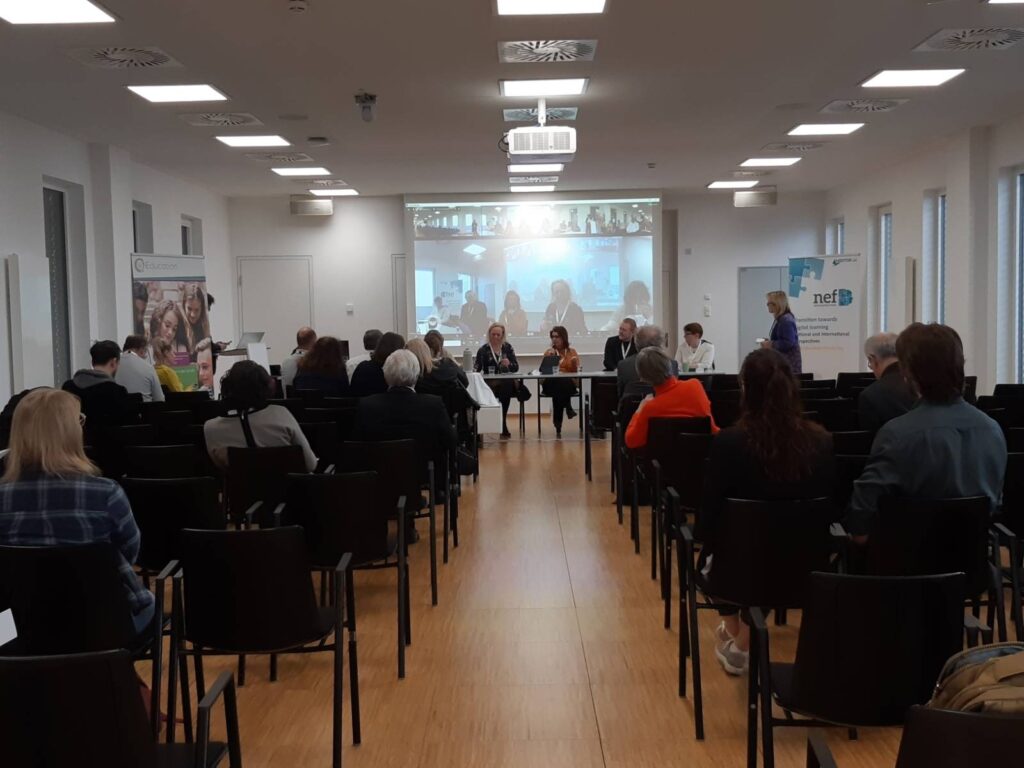On the 19th of January, 2023, the New Education Forum (NEF) Linz took place in the Pedagogical University of Upper Austria (PHOOE) in Linz, under the topic “Transition towards
digital learning – national and international perspectives”.
The event focused on the dissemination of Mentor 2.0, including a presentation of the overall
conceptual framework of the project, an overview of the results obtained from Result 1 in
each participating country, and the impact at regional, national and European levels.
During the regional New Education Forum in Linz, we focused on several challenges and three
main related themes:
• New teacher role: transition, institutional readiness – How can a paradigm change
occur in the educational system?
• Digitalisation and Inclusion – How can the introduction of digital media to classroom
work support changes and enhance inclusive pedagogy?
• National and international perspectives of Teachers’ Academies.
In the first panel, the discussion was attended by:
⇾ Karin STEPPAN, Educational Authority Upper Austria
⇾ Michael CSONGRADY, Center of Educational Management and Executive Development
⇾ Eva ANNAU, COOL-network
⇾ Kerstin ATZMÜLLER-RIESER, Academic School EuropaGym, Linz
At the beginning of the discussion, General Director of the Center for Innovative Education,
Mrs. Joanna Bochniarz, presented overall conceptual framework of the project Mentor 2.0,
overview of the project results and presented first result “Mentor 2.0 – Curriculum”.
In the months June – October 2022, the Center for Innovative Education – CIE, GTN, Femxa,
Lascó, and KEAN conducted online surveys addressed to the Polish, Spanish, Austrian, Italian
and Greek teachers and students of elementary and secondary level.
Consortium of the Mentor 2.0 project reached out to the total of 443 teachers and 417
students in five Mentor 2.0 countries. Conclusions from conducted surveys were further
elaborated in the Focus Groups with over 100 teachers and students of the formal. You can
find the report of the event below by scanning the QR code.
During the panel discussion, several important points were raised, namely, that school is
society, without school there is no society. Collaboration and learning from each other are key
elements. Nowadays, teamwork is a necessity, especially sharing knowledge, giving guidance,
showing students new tools. An important aspect of the role of a teacher is the changing of
roles and the attitude of the teacher.
In the second panel, the discussion was attended by:
⇾ Stefano COBELLO, PhD, Coordinator of European Pole of Knowledge, national network,
Italy
⇾ Dr Christian KORUNKA, Department of Occupational, Economic and Social Psychology,
University of Vienna
⇾ Tobias BUCHNER, Institute for Inclusive Pedagogy, Pedagogical University Upper
Austria
⇾ Christian WENZL, Education Lead Microsoft Austria
At the beginning of the discussion Andreas Riepl from GTN Solutions presented the results of
the second phase of the project, namely focus groups.
Data on individual partners regarding focus group:
• KEAN: 10 teachers and 12 students
• FEMXA: 10 teachers and 13 students
• GTN: 10 teachers and 15 students
• Lascò: 11 teachers and 10 students
• CIE: 24 teachers and 11 students
During the second panel, experts focused on the question of how important is the role of the
teacher and how can the introduction of digital media to classroom work support changes and
enhance inclusive pedagogy?
We drew attention to a few facts:
Christian Wenzl from Microsoft: We’re always, constantly looking for feedback – how to
improve the technology.
Dr Christian Korunka: digitalisation is the big driver, but not the only one, also flexibility.
Technology is a challenge – in the meaning to include everybody the way he or she wants to
work. In this case it will be useful. Society is happy to have big solution providers, with no
charge (free). What we will make out of this – this is the question.”
The third panel was titled “National and international perspectives of Teachers’ Academies.
How can networks of teacher education providers be involved in creating innovative strategies
for continuous professional development for teachers and schools?”.
The discussion was attended by:
⇾ Michael TEUTSCH, Head of Unit, DG Education, Youth, Sport and Culture, Directorate
B – Youth, Education and Erasmus+, European Commission
⇾ Kurt SÖSER, Entrepreneur, teacher trainer, international IT didactics specialist
⇾ Stephan WABA, Federal Ministry of Education, Research and Science, Department
Präs/16, ITDidactics
⇾ Niels DEJONG, Head of Institute International Cooperations and Study Programs,
Pedagogical University Upper Austria
⇾ Elena MILLI, relational psychotherapist and project manager for Europole, public body,
Italy
Michael Teutsch – from the EU side: European Commission is constantly exchanging of good
practices; uses E+ programmes for mobility or teachers to take knowledge from other
countries, across Europe. EU really believes in the power of mutual learning. Better
inclusions, sustainable development: these are important aims of Michael Teutsch unit – to
create inspirations to national policy makers.
Stephan Waba: Development of students IT competencies is important to force & support the
user technology at schools. In each subject there is a potential to support teachers (not only
in IT i.e.) Technology enables us to be creative.
Kurt Söser: The problems are at the end of the training: what do I have to do to follow up –
ask the teachers…
Elena Milli: job shadowing, personal experience. This is important apart from technology.
School can really change the society – we should remember that.
Recommendations from our event will appear in mid-January. Follow our social media to stay
up to date with the Mentor 2.0 project.
Below is the QR code for the report, where you can find the agenda of the event, description
of the panelists and an excerpt from the results 1 of the Mentor 2.0 project.
Stay tuned! Next event in May, this time we will see you in Naples!

